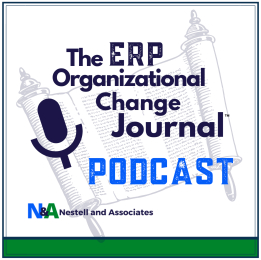There is a big difference between ERP implementation versus effective and efficient ERP implementation.
Article Contents
- ERP Implementation Methodologies: Understanding the Differences
- Challenges and Realities of ERP Organizational Change
- Illustration of ERP Implementation Methodologies: Vendor Perspectives
- Why Do Vendors and Implementers Promote and Even Brand Methodology?
- Advocating for Effective and Efficient Implementation Methodology
- A Key Pillar in Implementation Methodology: Organizational Learning and Development
- Practical Pointers to Ensure the Appropriate Implementation Methodology
- The Take-A-Way: Navigating ERP Implementation Methodologies
ERP Implementation Methodologies: Understanding the Differences
Variations and Promotions in ERP Implementation Methodologies
What we do know is that ERP implementation methodologies are not created equal. In fact, ERP vendors and implementers promote this notion and truth. Additionally, ERP researchers have suggested and studied this truth. We also know this in part by the way in which ERP vendors and implementors describe, sell, promote, advertise, and even brand ERP implementation methodology. During most ERP selection sales presentations, methodology is presented as a differentiator as compared to the competition. But, there is also a big difference between ERP implementation versus effective and efficient ERP implementation. Are some methodologies better than others? Absolutely. But why and how?
Challenges and Realities of ERP Organizational Change
Evidence of Challenges in ERP Implementations
It would stand to reason whether one performs an internet search of “ERP challenges and failures”, examines the demand for “expert witness” services, explores anecdotal feedback, peruses U.S. Securities and Exchange Commission filings, reads news and journal articles, questions references and customer feedback, and/or examines evidence-based inquiry or formal research, it would appear that ERP organizational change can be a significant endeavor with many obstacles and challenges. Being on time, on budget, meeting all functionality, and/or meeting all the stakeholder’s perceptions and definitions of success is an ERP organizational change challenge.
Variability in ERP Success and Methodology Efficiency
Research, case study, and anecdotal evidence suggest that many ERP organizational change efforts are “successful”, but this does not imply that 1) success was realized with no challenges or 2) that the success was effective and efficient. Of course, it is possible that ERP organizational change efforts could possibly realize immediate success (i.e., on-time, on-budget, meeting expected functionality, and meeting stakeholders’ perception of success). Many are ultimately successful after a great deal of time, money, and effort varying in significant degrees. Some ERP organizational change efforts struggle from the onset. And, some fail entirely.
Questioning the “Proven” Nature of ERP Methodologies
Just as there is a wide range of success or failure, there is also a wide range of effective and efficient implementation methodology. Can all implementation methodologies be “proven” and can they all be created equal? Highly unlikely. The answer in part depends on how “proven” methodologies are defined and what it means statistically. That is, does “proven” mean 100% successful in terms of on-time, on-budget, meeting expected functionality, and meeting stakeholders’ perception of success?
It would stand to reason that IF all methodologies were “proven” and they were all also created equal, then evidence suggesting otherwise (i.e., challenges and failures as noted above) would most likely be false. Not to simplify too much but there is some reasoning for thought and reflection. That is, let’s assume for a minute that all ERP implementation methodologies are “proven“, “proprietary“, “leading“, and “world-class“. Why? Because during an ERP selection process, this is precisely what you will hear. This is precisely what the sales cycle will lead you to believe. Have you ever heard a sales presentation where the ERP vendor, reseller, or implementor says that their ERP implementation methodology is “Well, it’s OK” or “It isn’t too bad” or “We have success but definitely run into challenges” or “62% of our projects are on-time, on-budget, meet all requirements, and all stakeholders agree project was a success? Doubtful.
IF “proven” implies and is defined as successful and being on time, on budget, meeting all requirements, and stakeholders would all agree that the endeavor has been successful. AND IF all “proven” methodologies are in fact created equal (in the sense that they are all successful in terms of on-time, on-budget, meeting all requirements, and all stakeholders would all agree that endeavor was successful.) THEN, either all/any evidence to the contrary is wrong OR it isn’t accurate to state that all methodologies are “proven” AND that they are created equal (i.e., the same).
That is IF #1 AND #2 are true, then all ERP organizational change efforts and their corresponding implementation methodologies would be successful (in the sense that on-time, on-budget, meeting all requirements, and all stakeholders would all agree that the endeavor was successful). If during an ERP selection process, the organization accepts the position of any given ERP vendor as having a “proven” methodology and the organization also takes the position and assumes that all methodologies are created equal, then the many statements such as these would be false:
- Stratman & Roth, 2018:
- “To improve responses to changes in markets and products, manufacturers are increasingly adopting ERP systems. However, anecdotal accounts indicate that the realization of ERP’s potential benefits is rare.” (Stratman & Roth, 2018)
- Hadi & EL-Sobky, 2015:
- “The implementation of such systems is a complex process, and the failure rate remains very high.” (Hadi & EL-Sobky, 2015)
- Jafari, Osman, Yusuf, & Tang, 2006 (as referenced by Noudoostbeni, Jenatabadi, Ismail, and Yasin, 2018):
- “…due to high rate of difficulties and failures in implementing the ERP systems, as explained in the review of literature, it can cause some disorders.” (Jafari, Osman, Yusuf, & Tang, 2006, as referenced by Noudoostbeni, Jenatabadi, Ismail, and Yasin, 2018)
- Shao, Feng, and Hu, 2017:
- “Extant literature suggests that few companies have fully appropriated the expected benefits from their ERP systems…..However, spectacular ERP failures are frequent.” (Shao, Feng, and Hu, 2017)
Illustration of ERP Implementation Methodologies: Vendor Perspectives
Introduction to Diverse Implementation Methodologies
In a recent ERP selection project, ERP vendors or their certified implementation partners were asked to detail their methodologies for implementation services. This section does not aim to judge or endorse any specific methodology but to demonstrate how methodologies are positioned during the selection and sales cycle. It highlights that:
- Methodologies are strategically positioned in sales cycles.
- Implementation methodologies and their contexts vary significantly.
- Common denominators may exist that contribute to successful ERP implementation.
Vendor Responses on ERP Implementation Methodologies
- Vendor #1: “Implementation methodology ensures immediate customer satisfaction and quick go-live. Excellent planning throughout the sales cycle leads to efficient and rapid deployment, ensuring rapid realization of ROI. <ERP vendor> has established industry-based leading practices, evident during the sales process and driving our training courses to build administrators’ expertise for problem-solving and ensuring project timelines are met.”
- Vendor #2: “Our proven implementation methodology, used globally, offers a flexible process for various project types and scales. It has been successful in delivering integrated solutions efficiently without significant business disruptions. This methodology provides the structure, controls, and risk mitigation necessary to meet project objectives, leading to a well-tested system, confident users, and reliable data.”
- Vendor #3: “Staffed by well-trained, globally located employees, our methodology encompasses five stages: Prepare, Plan, Design, Validate, and Deploy. Each stage consists of specific inputs, tools, techniques, and deliverables that build upon each other, enhancing continuous training, support, and best practices beyond mere implementation.”
- Vendor #4: “Our network of strategic partners with distinct qualifications supports a complete services delivery model. Our proprietary methodology ensures a collaborative and proven implementation framework. Knowledge and ownership gradually transfer to the project team, transforming them into drivers and champions of the new system and processes. Our customer-first approach is designed to deliver high value from business software swiftly.”
In conclusion to Evaluating ERP Implementation Methodologies
Choosing the right ERP implementation methodology is critical to the success of any ERP project. As demonstrated by the diverse approaches of various vendors, no single methodology fits all scenarios. Each vendor offers unique strengths and focuses that may align differently depending on organizational needs and goals. When selecting a methodology, organizations need to consider their specific requirements, the flexibility offered by the methodology, and how well it aligns with their operational dynamics and strategic objectives. Understanding these factors will help ensure that the selected ERP system is not only implemented successfully but also supports sustained organizational growth and efficiency.
Why Do Vendors and Implementers Promote and Even Brand Methodology?
Vendors and implementers promote and even brand methodology because implementation methodology matters. Methodology approach and the execution against that approach are crucial. During the ERP selection process, an inquiry into the tactical project plan details is beneficial to the organization. Research suggests that not only are there methodology process common denominators in successful organizational change but that implementation methodology grounded in principle and evidence-based practice is most effective and efficient.
Advocating for Effective and Efficient Implementation Methodology
There are many components to consider in terms of advocating for effective and efficient implementation methodology. In fact, full articles and books are written on this topic. In general, effective and efficient implementation methodology would include, from the highest level, effective and efficient management of the people, processes, and technology. For example, key organizational change influences such as sound project management, effective leadership, a supportive corporate culture, adequate change control, appropriate scope management, proper technology management, and effective business process implementation are just a few crucial influences that an effective and efficient methodology needs to consider.

A significant part of a successful ERP organizational change endeavor could be distilled down into education, learning, and development.
A Key Pillar in Implementation Methodology: Organizational Learning and Development
Whether the “people”, “processes”, or “technology” component of the triad: a significant part of a successful ERP organizational change endeavor could be distilled down into education, learning, and development. Therefore, for the implementation methodology to be effective, the organization in general and the individual stakeholders specifically need to develop mastery. Individuals must acquire component skills, practice integrating those skills, and also know when and how to apply new knowledge (Schraw & McCrudden, 2006). Providing organizations with opportunities for learning (and gap analysis) that utilizes and illustrates models of evaluation, performance analysis, and project management design that will promote communication, effective learning, and identification of issues are crucial methodology features. The effective and efficient implementation methodology would certainly include provisions for applying appropriate modeling, demonstration, practice, and feedback.
Practical Pointers to Ensure the Appropriate Implementation Methodology
Organizations aren’t typically ERP organizational change experts. What can organizations do to ensure the most appropriate methodology? Organizations apply effective and efficient ERP implementation models during an ERP organizational change project in part through principle and evidence-based practice. The methodology approach is a crucial influence impacting success. How do organizations apply effective and efficient ERP implementation models during an ERP organizational change? Some practical advice:
Engage Learning & Development (L&D) Expertise
Request the ERP sales team to involve L&D experts or explain their integrated systems approach to human performance and learning. While the value of organizational learning is undisputed, ensure that L&D principles are integrated into the methodology.
Leverage Change Management Support
Consider employing vendor-neutral change management support, L&D professionals, organizational change and culture experts, or certified project management (PM) professionals to analyze the implementation methodology and project plan details.
Inquire About Implementation Methodology
During the sales and selection process, ask specific questions about the implementation methodology. Dive into the details as they matter significantly.
Clarify “Proven” Definitions
Request a written statement defining what “proven” means to the ERP vendor. Clarify their interpretation of this term.
Request Proven Statistics
Ask for statistics that support the effectiveness of the methodology. Assess whether the organization provides concrete data or superficial claims.
Seek References
Request references for both successful and challenging projects. Observe how the ERP vendor responds to this request and inquire specifically about projects considered more challenging.
Conduct Thorough Research
Do your homework. Investigate for yourself based on as objective evidence as possible what you would conclude about any ERP methodology. Performs an internet search of “ERP challenges and failures for <Insert vendor here>”, examines the demand for “expert witness” services, explores anecdotal feedback (find your own references for <insert vendor here>, peruses U.S. Securities and Exchange Commission filings, read news and journal articles, question provided references thoroughly, and/or examines evidence-based inquiry or formal research.
Ensure Honesty in Sales Cycle
Question the honesty of the sales cycle. If claims of being “100% proven” are made, ask probing questions. The fact that ERP organizational change can be challenging should not surprise or deter any organization. But what is important is being honest about the realities and expectations of an ERP organizational change effort. A methodology that is honest in this truth will have mechanisms in which to address this truth. Honest and trusted partners matter.
The Take-A-Way: Navigating ERP Implementation Methodologies
ERP organizational change can be a significant challenge, but an intentional and disciplined approach to understanding the methodology can improve the success of implementation.
Methodologies need to account for unique organizations and their unique contexts. Methodologies also need to account for the many tangible and intangible influences including internal, and external, stakeholders’ knowledge, experience, and motivations. Research suggests recommended steps for success, which include ensuring that all influences critical to success are known and effectively implemented. Understanding methodology is important because 1) not all methodologies are created equal but yet all are “proven”, “leading”, and “world-class” and 2) a significant influence and objective in ERP implementation methodology is organizational and individual learning. This implies that the application of effective and efficient organizational, and individual, learning is an organizational advantage.
Most importantly, are there influences that may better advocate for organizational success through the most effective and efficient implementation methodologies? Perhaps, there are common denominators to look for in successful ERP implementation and methodology?
Dr. Jack G. Nestell
Get Vendor-Neutral Help With the ERP Selection Process at Nestell & Associates
There are a multitude of ERP system-affiliated consultants, and while they may be able to demonstrate software capabilities and use their expertise to problem-solve within that system, they will always put the product before the customer. The value of objective ERP system selection cannot be overstated. Vendor-neutral ERP consultants are proven to increase the success of ERP organizational change.
Nestell & Associates is an independent ERP consultancy that can lead your organization through the ERP selection process using experience and research-based evidence of ERP success rather than anecdotes or alignment with a particular ERP system. Contact us today to make sure you select the right ERP solution for your business.
References:
Bajwa, Garcia & Mooney (2004) An Integrative Framework for the Assimilation of Enterprise Resource Planning Systems: Phases, Antecedents, and Outcomes, Journal of Computer Information Systems, 44:3, 81-90
El Hadi & El-Sobky, H. (2015). A Proposed Framework for Knowledge Transfer in ERP Implementation Projects. Compunet (The Egyptian Information Journal), 314(3257), 1-8
Noudoostbeni, Jenatabadi, Ismail, and Yasin (2018). “An Effective End-User Knowledge Concern Training Method in Enterprise Resource Planning (ERP) Based on Critical Factors (CFs) in Malaysian SMEs.”
The ERP Organizational Change Journal – Podcast
We share smart ERP solutions and success stories, and promote organizational change and digital transformation success through industry trends and dedicated ERP professionals.


